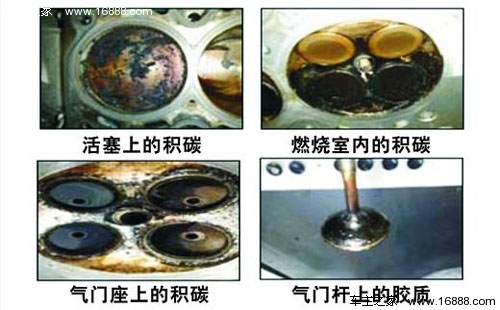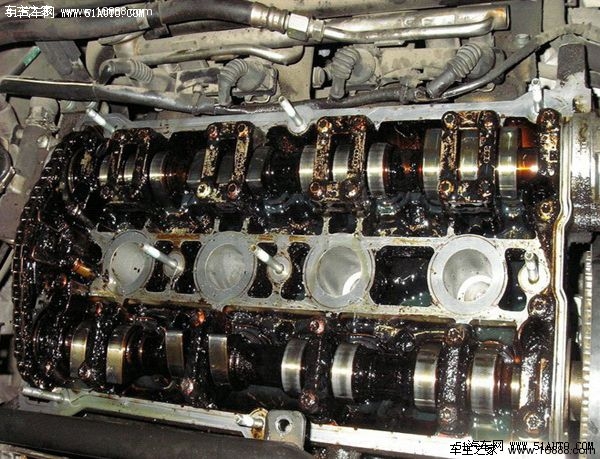【Owner's home car knowledge】Ms. Chen recently felt that her car was shaking a lot, especially when waiting for a red light, watching the safety buckle on the passenger seat tremble with the engine, "It's almost as good as the tractor I rode in when I was a child." I took the car to a 4S shop for a check, and it turned out that the carbon build-up was too serious. "The car repairer at the 4S shop said that my driving habits are not good. Not only is it easy to accumulate carbon, but it will damage the engine after a long time. There are many methods, but I don’t know if they are reliable or not?”
The reporter learned that Ms. Chen's "bad driving habits" include: as a means of commuting to and from work, idling in the downtown area for a long time; half a year may not be on a high speed; the most terrible thing is that Ms. Chen sends her children to interest classes on weekends. She herself can only read and play with her mobile phone in the car. When it is too cold or too hot, she must turn on the air conditioner for hours...
"The situation of this female car owner is very common now. Many private cars only drive five or six thousand kilometers a year. Although the manufacturer basically requires a maintenance every three months or 5,000 kilometers, few people pay attention to 'whichever comes first' This sentence explains. Without maintenance for a long time, plus not paying attention to driving, carbon deposits are inevitable." Experts told reporters that carbon deposits cannot be completely avoided, but taking good care of the car and maintaining good driving habits can indeed play a certain role. preventive effect. Experts commented on whether the methods found by Ms. Chen are reliable or not.
1. Can adding high-grade gasoline reduce carbon deposits?
Ma Fusheng, technical director of Hangzhou Dongfeng Nissan Yuantong Gangchang franchise store, told reporters that carbon deposits are mainly formed by impurities in gasoline and dust particles in the air, which settle down in the combustion chamber. High-grade gasoline has relatively fewer impurities. If possible, using high-grade gasoline is really good for the engine.
In the same way, don't often run on dusty roads, and clean the air grill (air filter) frequently, which can also reduce carbon accumulation. Every 20,000 kilometers, it is best to replace the air grid, and clean the fuel injector and throttle. If you save this little money, if the engine needs to be overhauled due to serious carbon deposits, it will be a small loss.
2. Will idling for a long time, parking and turning on the air conditioner cause carbon deposition?
Don't let the vehicle idle for a long time, especially don't turn on the air conditioner when idling for a long time. "When the water temperature is 85-90°C, the engine will be in the best working condition, otherwise the gasoline will not burn sufficiently and there will be more carbon deposits. From this point of view, if the car is warmed up for a long time in the morning, the engine temperature will rise very slowly, which will also cause carbon deposits. The air conditioner is running at idling speed, which will put a load on the engine." However, Director Ma also thinks that there is no need to go too far. If it only takes a few minutes to wait for someone, there is no need to turn off the engine. Because the moment of restarting, not only the fuel consumption is high, but also the engine will be worn out.
3. Can running at high speed wash away carbon deposits?
Running at high speed can indeed use the airflow to scour the airway to wash away part of the carbon deposits. Therefore, if you happen to have the choice of taking the high speed or the national road when you go out, you might as well choose to take the high speed back. However, Director Ma believes that if you run at high speed specifically to "wash away carbon deposits", it is not necessary. "It's a waste of time, fuel, and high-speed tolls. The effect is not as good as going to a 4S shop for maintenance!"
4. Increase the speed of gear shifting. For example, if the original speed is 2000rpm, change it to 2500rpm, which can prevent the formation of carbon deposits and protect the engine?
Director Ma said that shifting gears at low speeds is what is often referred to as "dragging", the car is prone to knocking, and insufficient gasoline combustion leads to carbon deposits. But it is not necessary to artificially increase the shift speed - this will increase fuel consumption and cause premature wear of the clutch friction plates. Therefore, for a car with a manual transmission, with a displacement of 1.6-2.0L, it is more economical to change gears at around 2000 rpm, and there is no need to increase it; for a car with an automatic transmission, be careful not to accelerate the gas too hard.
5. When the car is parked, put it in neutral and slam on the accelerator, can it wash away carbon deposits like running at high speed?
In theory, slamming the accelerator at idle speed will wash away some carbon deposits, but this method is not recommended. First of all, it is a waste of gasoline and pollutes the environment; secondly, idling is not good for the engine. Especially when the speed reaches above 4000 rpm, if it is not running on the road, there is no wind blowing in to cool the engine, which will affect the engine. Those who really want to rely on air flow to wash away carbon deposits should run at high speeds!
6. I heard that the chemical composition in the fuel cleaning agent for removing carbon deposits has a certain corrosive effect on the rubber fuel supply pipeline. Will the gain outweigh the loss?
Qualified fuel cleaning agents can remove carbon deposits in fuel chambers, fuel injectors, and exhaust pipes better than gasoline. Of course, these chemicals are corrosive to a certain extent, and 4S stores have regulations on their use and operation. If you accidentally drip them on your hands, it will be very serious.
However, even if the medicine is three-point poisonous, people still have to take medicine when they are sick. For the same reason, in contrast, these products should still be used when needed.
7. I heard that cleaning without dismantling can not completely remove carbon deposits; the machine can be disassembled for cleaning, but what should I do if I am afraid of damaging the engine?
Dismantling and cleaning is of course cleaner, but there are advantages and disadvantages. After the engine is turned on, it is inevitable that there will be sequelae such as air leakage. Under normal circumstances, it can be cleaned without dismantling and cleaning, which saves time. However, some cars accidentally use low-quality engine oil, which will jam the piston ring; or when refueling, some gas stations have poor oil quality, which will seriously block the fuel injector, so they can only be disassembled and washed.
8. What is the difference between fuel cleaner and fuel oil? Can fuel oil remove carbon deposits?
The fuel cleaning agent is mainly aimed at carbon deposits in the fuel system, and is professionally cleaned through equipment. The fuel oil is directly added to the fuel tank, which can make the gasoline burn more fully. Some high-end cars have more accurate sensors and have higher requirements for oil products. If the gasoline does not meet the standard, the emission light on the dashboard will light up, which can be prevented by adding a fuel treasure. However, ordinary family cars do not have such high requirements, and fuel oil is relatively expensive. Car owners can decide according to their economic affordability.
9. What is the most effective and convenient way to remove carbon deposits?
Carbon deposition is still the main prevention:Don't use fake and inferior lubricating oil, go to a regular repair shop for maintenance. If low-quality engine oil is used, the effect will not be seen in a short period of time, but after a year or two, it will cause serious carbon deposits and even damage the engine.
Strictly follow the instructions for maintenance. For example, maintenance is required every 3 months or 5,000 kilometers, and a private car is driven less than 5,000 to 6,000 kilometers a year, but it should be maintained every four to five months-the oil in the engine will oxidize and deteriorate after a long time. If it is not replaced in time, the consequences may not be visible once or twice, but the impact of carbon deposits on the engine is a process of gradual wear and tear over time.
In addition, it is also very important to develop good driving habits, such as not to accelerate the accelerator too hard, and not to idle for a long time.










 Email:
Email: